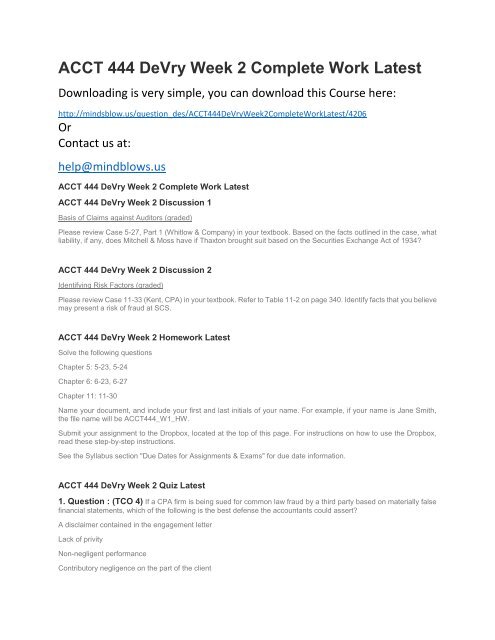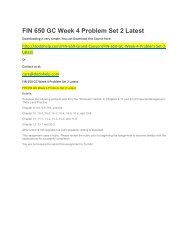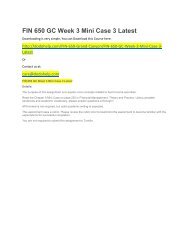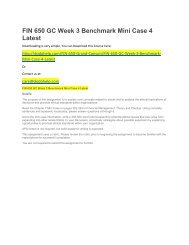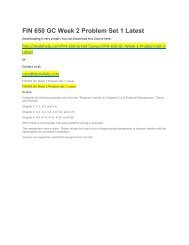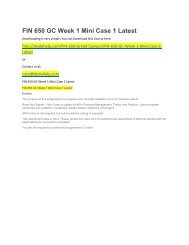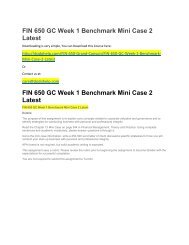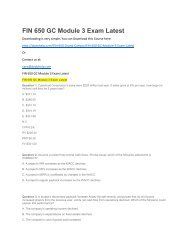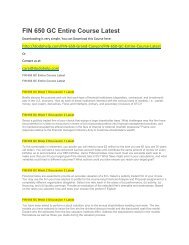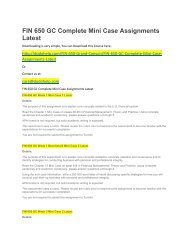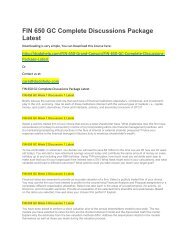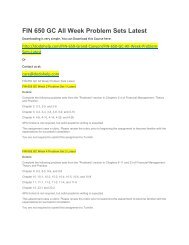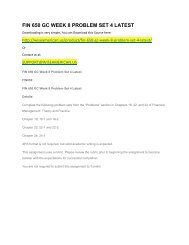ACCT 444 DeVry Week 2 Complete Work Latest
Create successful ePaper yourself
Turn your PDF publications into a flip-book with our unique Google optimized e-Paper software.
<strong>ACCT</strong> <strong>444</strong> <strong>DeVry</strong> <strong>Week</strong> 2 <strong>Complete</strong> <strong>Work</strong> <strong>Latest</strong><br />
Downloading is very simple, you can download this Course here:<br />
http://mindsblow.us/question_des/<strong>ACCT</strong><strong>444</strong><strong>DeVry</strong><strong>Week</strong>2<strong>Complete</strong><strong>Work</strong><strong>Latest</strong>/4206<br />
Or<br />
Contact us at:<br />
help@mindblows.us<br />
<strong>ACCT</strong> <strong>444</strong> <strong>DeVry</strong> <strong>Week</strong> 2 <strong>Complete</strong> <strong>Work</strong> <strong>Latest</strong><br />
<strong>ACCT</strong> <strong>444</strong> <strong>DeVry</strong> <strong>Week</strong> 2 Discussion 1<br />
Basis of Claims against Auditors (graded)<br />
Please review Case 5-27, Part 1 (Whitlow & Company) in your textbook. Based on the facts outlined in the case, what<br />
liability, if any, does Mitchell & Moss have if Thaxton brought suit based on the Securities Exchange Act of 1934?<br />
<strong>ACCT</strong> <strong>444</strong> <strong>DeVry</strong> <strong>Week</strong> 2 Discussion 2<br />
Identifying Risk Factors (graded)<br />
Please review Case 11-33 (Kent, CPA) in your textbook. Refer to Table 11-2 on page 340. Identify facts that you believe<br />
may present a risk of fraud at SCS.<br />
<strong>ACCT</strong> <strong>444</strong> <strong>DeVry</strong> <strong>Week</strong> 2 Homework <strong>Latest</strong><br />
Solve the following questions<br />
Chapter 5: 5-23, 5-24<br />
Chapter 6: 6-23, 6-27<br />
Chapter 11: 11-30<br />
Name your document, and include your first and last initials of your name. For example, if your name is Jane Smith,<br />
the file name will be <strong>ACCT</strong><strong>444</strong>_W1_HW.<br />
Submit your assignment to the Dropbox, located at the top of this page. For instructions on how to use the Dropbox,<br />
read these step-by-step instructions.<br />
See the Syllabus section "Due Dates for Assignments & Exams" for due date information.<br />
<strong>ACCT</strong> <strong>444</strong> <strong>DeVry</strong> <strong>Week</strong> 2 Quiz <strong>Latest</strong><br />
1. Question : (TCO 4) If a CPA firm is being sued for common law fraud by a third party based on materially false<br />
financial statements, which of the following is the best defense the accountants could assert?<br />
A disclaimer contained in the engagement letter<br />
Lack of privity<br />
Non-negligent performance<br />
Contributory negligence on the part of the client
Question 2. Question : (TCO 4) "Absence of reasonable care that can be expected of a person is a set of<br />
circumstances" defines<br />
pecuniary negligence.<br />
gross negligence.<br />
extreme negligence.<br />
ordinary negligence.<br />
Question 3. Question : (TCO 4) A third-party beneficiary is one that<br />
has failed to establish legal standing before the court.<br />
does not have privity of contract and is unknown to the contracting parties.<br />
does not have privity of contract, but is known to the contracting parties and intended to benefit under the contract.<br />
may establish legal standing before the court after a contract has been consummated.<br />
Question 4. Question : (TCO 4) Tort actions against CPAs are more common than breach of contract actions<br />
because<br />
there are more torts than contracts.<br />
the burden of proof is on the auditor rather than on the person suing.<br />
the person suing need prove only negligence.<br />
the amounts recoverable are normally larger.<br />
Question 5. Question : (TCO 4) If the auditor believes that the financial statements are not fairly stated or is<br />
unable to reach a conclusion because of insufficient evidence, the auditor<br />
should withdraw from the engagement.<br />
should request an increase in audit fees so that more resources can be used to conduct the audit.<br />
has the responsibility of notifying financial statement users through the auditor’s report.<br />
should notify regulators of the circumstances.<br />
Question 6. Question : (TCO 3) Which of the following is not one of the reasons that auditors provide only<br />
reasonable assurance on the financial statements?<br />
The auditor commonly examines a sample, rather than the entire population of transactions.<br />
Accounting presentations contain complex estimates, which involve uncertainty.<br />
Fraudulently prepared financial statements are often difficult to detect.<br />
Auditors believe that reasonable assurance is sufficient in the vast majority of cases.<br />
Question 7. Question : (TCO 3) In the fraud triangle, fraudulent financial reporting and misappropriation of assets<br />
share little in common.<br />
share most of the same risk factors.<br />
share the same three conditions.<br />
share most of the same conditions.<br />
Question 8. Question : (TCO 3) Fraudulent financial reporting may be accomplished through the manipulation<br />
of<br />
assets.<br />
liabilities.
evenues.<br />
all of the above.<br />
Question 9. Question : (TCO 3) Which of the following is a factor that relates to incentives to misappropriate<br />
assets?<br />
Significant accounting estimates involving subjective judgments<br />
Significant personal financial obligations<br />
Management's practice of making overly aggressive forecasts<br />
High turnover of accounting, internal audit and information technology staff<br />
Question 10. Question : (TCO 3) Which of the following characteristics is most likely to heighten an auditor's<br />
concern about the risk of material misstatements, due to fraud in an entity's financial statements?<br />
Employees who handle cash receipts are not bonded.<br />
The entity's industry is experiencing declining customer demand.<br />
Internal auditors have direct access to the board of directors and the entity's management.<br />
The board of directors is active in overseeing the entity's financial reporting policies.


